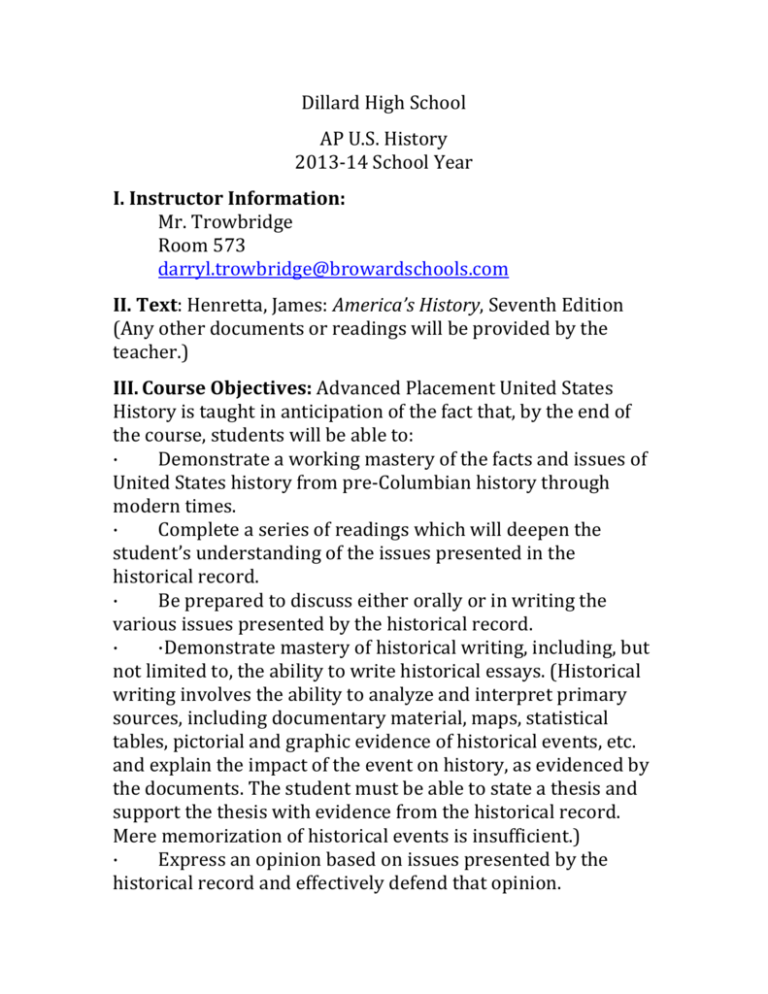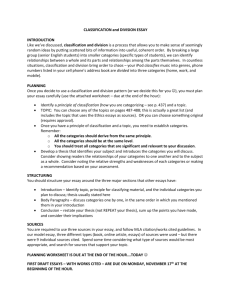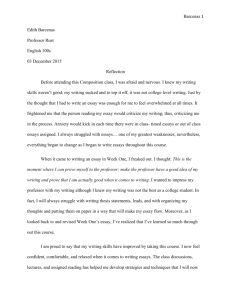I. Instructor Information
advertisement

Dillard High School AP U.S. History 2013-14 School Year I. Instructor Information: Mr. Trowbridge Room 573 darryl.trowbridge@browardschools.com II. Text: Henretta, James: America’s History, Seventh Edition (Any other documents or readings will be provided by the teacher.) III. Course Objectives: Advanced Placement United States History is taught in anticipation of the fact that, by the end of the course, students will be able to: · Demonstrate a working mastery of the facts and issues of United States history from pre-Columbian history through modern times. · Complete a series of readings which will deepen the student’s understanding of the issues presented in the historical record. · Be prepared to discuss either orally or in writing the various issues presented by the historical record. · ·Demonstrate mastery of historical writing, including, but not limited to, the ability to write historical essays. (Historical writing involves the ability to analyze and interpret primary sources, including documentary material, maps, statistical tables, pictorial and graphic evidence of historical events, etc. and explain the impact of the event on history, as evidenced by the documents. The student must be able to state a thesis and support the thesis with evidence from the historical record. Mere memorization of historical events is insufficient.) · Express an opinion based on issues presented by the historical record and effectively defend that opinion. · Incorporate documents from the historical record in a historical essay and effectively argue why the documents do or do not support the thesis of the essay. · Demonstrate sufficient knowledge and writing ability to achieve a passing score on the APUSH examination. All students will sit for the examination. IV. Grading/Assignments: Students will be assigned chapter readings from the textbook not less than weekly in anticipation of topics to be discussed in class. Additional reading material from a variety of sources will also be provided as part of individual lessons. Tests will be administered after every unit, with each unit being approximately 3-4 chapters. The tests will consist of multiple choice questions, with questions taken from past AP US exams, as available. An essay question will also be given which will require students to write a well structured historical essay. Quizzes will also be given to assess comprehension and understanding in between tests. Students will also periodically be assigned essays for writing, approximately one each week. Essays will be assigned more frequently as students become comfortable with writing, and the date for the examination approaches. Every precaution will be taken that essays and tests are not scheduled too closely. A number of essays will be assigned as homework, with students normally given two to three days to complete the same. Other essays will be written in class with a time limit imposed similar to that imposed under actual testing conditions to acclimate students to writing under time constraints. Whenever possible, essays will be drawn from previous Document Based Questions (DBQ’s) or Free Response Questions (FRQ’s). Students will also be expected to complete a book assignment which is due after Spring Break (3/31/14). Students are expected to write a critique of the book on how it relates to the American experience. The books list is as follows: Bernstein, Carl All the President’s Men Three-African American Classics: Up from Slavery, The Souls of Black Folk, Narrative of the Life of Fredrick Douglas Riis, Jacob How the Other Half Lives Sinclair, Upton The Jungle Steinbeck, John The Grapes of Wrath Stowe, Harriet Beecher Uncle Tom’s Cabin Grading: Homework:30% Classwork/Participation:20% Tests and Essays:50% Class Participation: All students are expected to be fully prepared and to participate actively in class discussion. Some students are more comfortable speaking publicly than others; therefore students who merely listen and are attentive will be considered to be actively participating in the lesson. All students must remain 100 per cent engaged throughout the course of the lesson. Sleeping, inattentiveness, and distractive behavior do not constitute active engagement, and any such conduct will have a negative impact when grades are determined. Cell phones are not to be used during class time unless the teacher gives permission. V. Due Dates: All assignments will be due at the beginning of class on the date designated. No late work will be accepted unless a student is absent on the due date and an excused absence presented on the date the student returns to class. Assignments not handed in by the start of class on the due date will receive a grade of zero. VI. Supply List: At least a 2” 3-ring binder Lots of loose-leaf lined paper Dividers for binder Pens/pencils Highlighter VII. Academic Integrity: All work turned in for credit must be the student’s own original work; it must not be plagiarized nor obtained by any other dishonest or inappropriate means. Assistance or coaching from any third person, including but not limited to former students, parents, etc. on any work submitted for credit is inappropriate. VIII. Caution: One of the differences between college and high school classes is that high school students tend to be dependent on classes for learning. It is not possible to cover all of the material that is tested in class. The course is for all intents and purposes taught on a college level and it requires a substantial amount of reading and preparation for every class. You will have to read and learn material on your own. You will be tested on material that is not covered in class.











